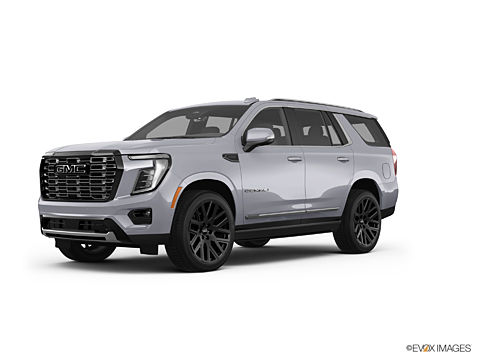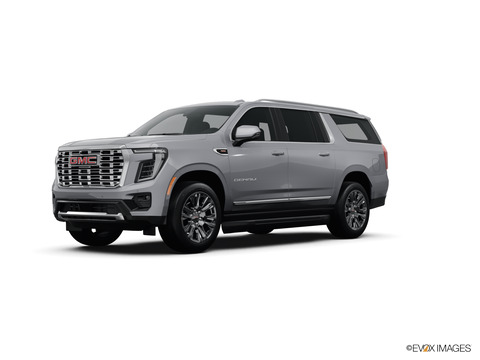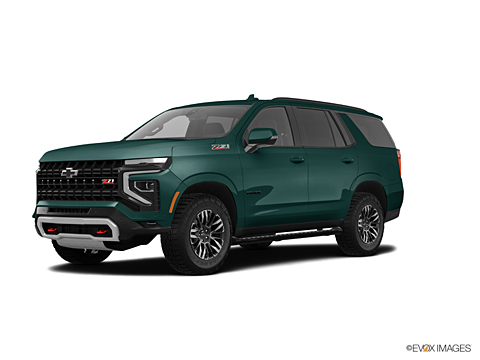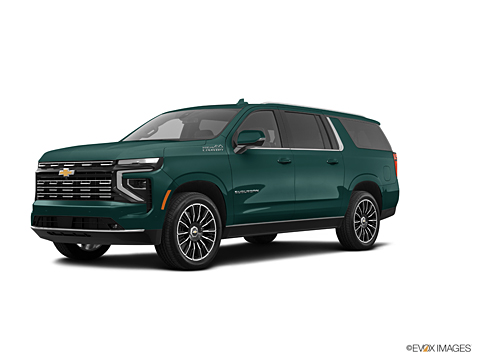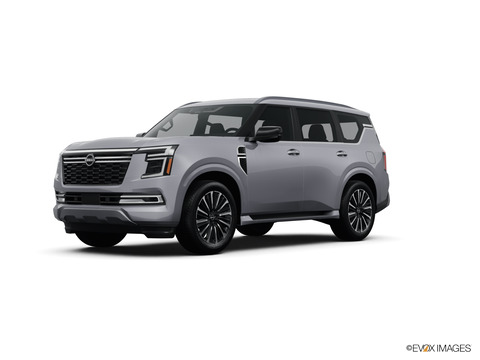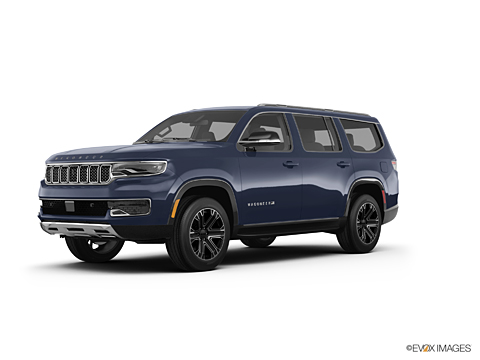
Best Large SUVs for 2025
The best large SUVs are ranked based on a data-driven analysis of over 330 million vehicles' reliability, resale value, and safety.
iSeeCars applies data science to over 330 million vehicles in order to understand each model’s reliability and how long-lasting it is, its safety, and its ability to retain value over time. This analysis allows iSeeCars to rank large SUVs by a data-driven and objective methodology, instead of relying on subjective editorial criteria.
The best large SUV is the Toyota Land Cruiser. Its iSeeCars Quality Score of 8.7 out of 10 reflects the Land Cruiser's reliability, value retention and safety scores. A new Toyota Land Cruiser costs between $85,665 and $87,995 while a used version costs between $63,877 and $91,335. This large SUV can seat up to 8 people and is EPA rated to deliver up to 14 miles per gallon in mixed city/highway driving.
The Large SUV category consists of 12 models priced between $50,500 and $112,540 for new vehicles and between $23,777 and $104,996 for used vehicles. iSeeCars has sufficient vehicle data to rate and rank 8 of these 12 models based on their reliability, value retention and safety scores.
Why Should I Buy a Large SUV?
With their expansive cargo space and three full rows of seating, large SUVs are the preferred choice for drivers who want a roomy and comfortable vehicle. These SUVs used to be built on truck-based platforms, with a rough ride quality and unwieldy handling that reflected their industrial foundations. Today’s large SUVs, in contrast, are remarkably comfortable and quiet, with relatively confident handling. However, fuel efficiency remains a disadvantage compared to smaller SUVs.
Full-size SUVs are an ideal choice for drivers who want powerful vehicles with massive cargo holds. While the entire segment offers ample cargo and passenger space, some are more spacious than others.
What are the Best Large SUVs?
These big, brawny SUVs have strong powertrains, which often include V8 engines. And because most large SUVs still use body-on-frame construction and are built on pickup truck platforms, they have a higher towing capacity than their midsize and compact SUV counterparts. Large SUVs come standard with rear-wheel drive, while four-wheel drive (4WD) is available for improved all-weather capabilities. These large SUVs return sub-par fuel economy as a result of their power and size, but they have many safety and family-friendly tech features like rear-seat entertainment systems and touchscreen infotainment systems.
What Other Vehicles Should I Consider?
Buyers seeking smaller SUVs or crossover SUVs should check out iSeeCars’ Best Midsize SUVs or Best Small SUVs lists. Premium luxury SUV models are ranked in the Best Luxury Large SUV list while all-electric models are in the Best Electric SUVs list. Lastly, for a more efficient family hauler, be sure to check out iSeeCars’ Best Minivans list.

Why Should I Buy a Large SUV?
With their expansive cargo space and three full rows of seating, large SUVs are the preferred choice for drivers who want a roomy and comfortable vehicle. These SUVs used to be built on truck-based platforms, with a rough ride quality and unwieldy handling that reflected their industrial foundations. Today’s large SUVs, in contrast, are remarkably comfortable and quiet, with relatively confident handling. However, fuel efficiency remains a disadvantage compared to smaller SUVs.
Full-size SUVs are an ideal choice for drivers who want powerful vehicles with massive cargo holds. While the entire segment offers ample cargo and passenger space, some are more spacious than others.
What are the Best Large SUVs?
These big, brawny SUVs have strong powertrains, which often include V8 engines. And because most large SUVs still use body-on-frame construction and are built on pickup truck platforms, they have a higher towing capacity than their midsize and compact SUV counterparts. Large SUVs come standard with rear-wheel drive, while four-wheel drive (4WD) is available for improved all-weather capabilities. These large SUVs return sub-par fuel economy as a result of their power and size, but they have many safety and family-friendly tech features like rear-seat entertainment systems and touchscreen infotainment systems.
What Other Vehicles Should I Consider?
Buyers seeking smaller SUVs or crossover SUVs should check out iSeeCars’ Best Midsize SUVs or Best Small SUVs lists. Premium luxury SUV models are ranked in the Best Luxury Large SUV list while all-electric models are in the Best Electric SUVs list. Lastly, for a more efficient family hauler, be sure to check out iSeeCars’ Best Minivans list.

1. Toyota Land Cruiser
 iSEECARS SCORE
iSEECARS SCORE

iSeeCars Best Car Rankings are calculated based on an analysis of data from over 12 million cars that assesses how long each vehicle lasts and how well it retains its value over time, along with safety data from the National Highway Traffic Safety Association
See how we rank these cars
-
Reliability 8.8 / 10
-
Value Retention 8.6 / 10
-
Safety Not Available
2. Toyota Sequoia
 iSEECARS SCORE
iSEECARS SCORE

iSeeCars Best Car Rankings are calculated based on an analysis of data from over 12 million cars that assesses how long each vehicle lasts and how well it retains its value over time, along with safety data from the National Highway Traffic Safety Association
See how we rank these cars
-
Reliability 8.4 / 10
-
Value Retention 8.5 / 10
-
Safety Not Available
 iSEECARS SCORE
iSEECARS SCORE

iSeeCars Best Car Rankings are calculated based on an analysis of data from over 12 million cars that assesses how long each vehicle lasts and how well it retains its value over time, along with safety data from the National Highway Traffic Safety Association
See how we rank these cars
-
Reliability 7.5 / 10
-
Value Retention 7.3 / 10
-
Safety 8.0 / 10
 iSEECARS SCORE
iSEECARS SCORE

iSeeCars Best Car Rankings are calculated based on an analysis of data from over 12 million cars that assesses how long each vehicle lasts and how well it retains its value over time, along with safety data from the National Highway Traffic Safety Association
See how we rank these cars
-
Reliability 7.8 / 10
-
Value Retention 7.6 / 10
-
Safety 7.0 / 10
 iSEECARS SCORE
iSEECARS SCORE

iSeeCars Best Car Rankings are calculated based on an analysis of data from over 12 million cars that assesses how long each vehicle lasts and how well it retains its value over time, along with safety data from the National Highway Traffic Safety Association
See how we rank these cars
-
Reliability 7.8 / 10
-
Value Retention 7.3 / 10
-
Safety 7.0 / 10
 iSEECARS SCORE
iSEECARS SCORE

iSeeCars Best Car Rankings are calculated based on an analysis of data from over 12 million cars that assesses how long each vehicle lasts and how well it retains its value over time, along with safety data from the National Highway Traffic Safety Association
See how we rank these cars
-
Reliability 7.7 / 10
-
Value Retention 7.6 / 10
-
Safety 7.0 / 10
 iSEECARS SCORE
iSEECARS SCORE

iSeeCars Best Car Rankings are calculated based on an analysis of data from over 12 million cars that assesses how long each vehicle lasts and how well it retains its value over time, along with safety data from the National Highway Traffic Safety Association
See how we rank these cars
-
Reliability 7.7 / 10
-
Value Retention 7.4 / 10
-
Safety 7.0 / 10
 iSEECARS SCORE
iSEECARS SCORE

iSeeCars Best Car Rankings are calculated based on an analysis of data from over 12 million cars that assesses how long each vehicle lasts and how well it retains its value over time, along with safety data from the National Highway Traffic Safety Association
See how we rank these cars
-
Reliability 7.5 / 10
-
Value Retention 7.1 / 10
-
Safety 7.0 / 10
 iSEECARS SCORE
iSEECARS SCORE

iSeeCars Best Car Rankings are calculated based on an analysis of data from over 12 million cars that assesses how long each vehicle lasts and how well it retains its value over time, along with safety data from the National Highway Traffic Safety Association
See how we rank these cars
-
Reliability Coming soon
-
Value Retention 7.9 / 10
-
Safety 8.0 / 10
 iSEECARS SCORE
iSEECARS SCORE

iSeeCars Best Car Rankings are calculated based on an analysis of data from over 12 million cars that assesses how long each vehicle lasts and how well it retains its value over time, along with safety data from the National Highway Traffic Safety Association
See how we rank these cars
-
Reliability Coming soon
-
Value Retention 7.9 / 10
-
Safety Not Available
 iSEECARS SCORE
iSEECARS SCORE

iSeeCars Best Car Rankings are calculated based on an analysis of data from over 12 million cars that assesses how long each vehicle lasts and how well it retains its value over time, along with safety data from the National Highway Traffic Safety Association
See how we rank these cars
-
Reliability Coming soon
-
Value Retention 7.9 / 10
-
Safety Not Available
 iSEECARS SCORE
iSEECARS SCORE

iSeeCars Best Car Rankings are calculated based on an analysis of data from over 12 million cars that assesses how long each vehicle lasts and how well it retains its value over time, along with safety data from the National Highway Traffic Safety Association
See how we rank these cars
-
Reliability Coming soon
-
Value Retention 7.1 / 10
-
Safety 8.0 / 10
Related Rankings
How We Rank These Cars
iSeeCars Best Car Rankings are calculated based on the latest analysis by our data science team of more than 330 million cars.
The overall iSeeCars Quality Score combines analyses of these three factors: reliability, resale value, and safety. It is calculated based on the latest research and analysis by our data science team. The data analysis comes from over 330 million vehicles as reported in our Longest-Lasting Cars and 5-Year Depreciation Studies. These two factors are combined with NHTSA and/or IIHS Safety Ratings to determine a car’s Quality Score. Only cars with recent model years are included.
Each vehicle is rated on a scale from 1 to 10, with 10 being the highest Quality Score. Vehicles within a given category are sorted to show the highest-scoring ones first. If two cars have the same ratings, the tie is broken by the Reliability Rating, Value Retention Score, and Safety Score. iSeeCars displays comprehensive Quality Scores along with the subscores for each model because multiple factors should be taken into account when buyers are seeking the best overall vehicle.
Vehicles are scored in three categories:

Reliability
The reliability score represents an analysis of iSeeCars' proprietary research on the longest-lasting vehicles.

Value Retention
The value retention score is based on our data science team's statistical analysis and prediction of 5-year depreciation from MSRP to determine which cars hold their value best, using US Bureau of Labor Statistics data to adjust for inflation.

Safety
The safety score is calculated based on the last five years of crash test ratings from the National Highway Traffic Safety Administration (NHTSA) and incorporates the latest Top Safety Pick information from the Insurance Institute for Highway Safety (IIHS).




